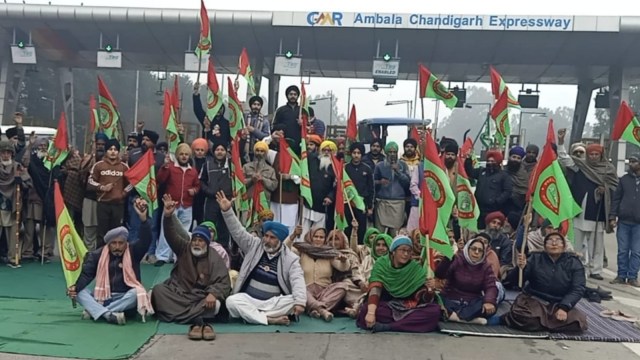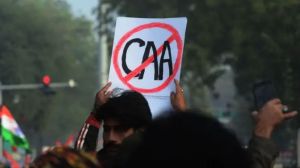Bandh called by farmers brings Punjab to a halt, Supreme Court hearing today
This comes a day ahead of a Supreme Court hearing in which it will take stock of the Punjab government’s efforts to provide treatment to farmer leader Jagjit Singh Dallewal, who has been on indefinite hunger strike for 35 days.
 Protest at Dapper toll plaza in Punjab's Mohali. (Express Photo: Raakhi Jagga)
Protest at Dapper toll plaza in Punjab's Mohali. (Express Photo: Raakhi Jagga)A nine-hour bandh call by protesting farmers under the banner of the Kisan Mazdoor Morcha (KMM) and the Samyukt Kisan Morcha-Non Political (SKM-NP) over several demands, including legal guarantee for MSP, brought Punjab to a halt on Monday.
This comes a day ahead of a Supreme Court hearing in which it will take stock of the Punjab government’s efforts to provide treatment to farmer leader Jagjit Singh Dallewal, who has been on indefinite hunger strike for 35 days. Dallewal has refused treatment and resisted attempts to move him to hospital.
On Monday, roads were blocked and trains were stopped at over 250 locations in Punjab as part of the bandh that was in force from 7 am to 4 pm. As many as 172 train services, including Vande Bharat, were cancelled and 232 train services were affected. A large number of shops and industrial units were also closed.
Apart from KMM and SKM-NP, two constituents of SKM – Krantikari Kisan Union (KKU) and BKU Dakaunda (Dhaner) – also supported the bandh call.
KKU president Darshan Pal said, “Our union supported the bandh call and in 12 districts, our members participated in it. We fully support all the demands of the farmers protesting at Shambhu and Khanauri borders.”
 Protesters block the Delhi-Amritsar highway in Ludhiana on Monday. (Express photo by Gurmeet Singh)
Protesters block the Delhi-Amritsar highway in Ludhiana on Monday. (Express photo by Gurmeet Singh)
At Shambhu railway station, Sukhwinder Kaur, general secretary of BKU Krantikari, led the dharna, and at Dapper Toll Plaza in Mohali on the NH-152, the dharna was led by farmer leader Baljit Kaur – also of BKU Krantikari.
Sarwan Singh Pandher, coordinator of KMM and SKM-NP, was in Amritsar, which also saw the most number of protests – 32 – followed by 12 in Patiala, 10 in Moga and nine in Sangrur. Pandher said people supported the bandh call and that no one was forced to close their premises.
BKU Dakaunda (Dhaner) blockaded the road at around 12 places each in Barnala, Sangrur and Mansa in support of both forums, confirmed Manjit Singh Dhaner, president of the union.
The Bharti Kisan Union-Ugrahan chalked out separate programmes in support of the bandh call. Its members burnt effigies at more than 50 locations in 16 districts, said Sukhdev Singh Kokrikalan, general secretary of BKU-Ugrahan.
Leaders of industrial bodies criticised the protesters for the disruptions caused by the bandh.
Convener of the All Industries and Trade Forum, Badish Jindal, told The Indian Express, “We can’t have Punjab be labelled a ‘protest state’. We are known as hardworking people and cannot afford to ruin our economy.” He said that members of various farmer unions got into confrontations with the public in many places and that people were being “deprived of their right to do business”.
“The state has become a mute spectator,” he said.
Upkar Singh, president of the Chamber of Industrial and Commercial Undertakings (CICU) said that in many places, workers were stopped from going to factories as roads were blocked with tractors and trolleys. “Most factories either could not work or they operated partially. We don’t support such bandh calls. If markets or factories were closed, it is not that people closed them wilfully. A large percentage of them had to do it out of compulsion as they were not allowed to reach the workplace. We are with farmers but they also need to be with industries,” he said.
Pankaj Sharma, president of the Association of Trade and Industrial Undertakings (ATIU), said, “The loss incurred due to today’s bandh could go beyond Rs 500 crore. Such disruptions have started increasing in the last few years and this could affect future investments, shattering the confidence of investors in the state as well as those from outside.”
Though the Punjab Pradesh Beopar Mandal had issued a statement that they were against the bandh call, markets in most districts, barring Ludhiana’s city area, remained closed.
Sunil Mehra, general secretary of the Punjab Pradesh Beopar Mandal, said, “The state is already grappling with an economic slowdown. Due to instability in law and order, traders from outside are hesitant to invest in Punjab. Once-thriving businesses have started to decline. Hence we appeal to farmers to recognise that both farmers and traders are the backbone of Punjab’s economy. We urge you to avoid actions that harm one section while benefiting another.”
Meanwhile, the health of farmer leader Dallewal, who has been on an indefinite fast at the Khanauri border point since November 26, continued to deteriorate.
On December 28, the Supreme Court came down heavily on the Punjab government for not moving Dallewal to a hospital. The court has posted the matter for further hearing on December 31.
The Punjab government has said it is facing major resistance from protesting farmers who had encircled Dallewal and prevented him from being taken to hospital.
(With PTI inputs)







